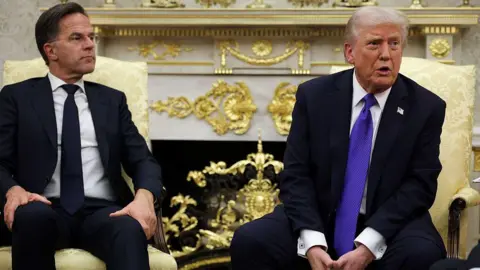US President Donald Trump announced what he called “huge” new sanctions against Russia's two biggest oil companies in a bid to pressure Moscow to end its war with Ukraine.
According to US Treasury Secretary Scott Bessent, these measures are aimed at Rosneft and Lukoil, the two largest oil corporations that help finance the Kremlin's war machine.
They represent the Trump administration's first direct intervention with Russia over its invasion and are therefore seen as a geopolitically significant moment.
Which companies are subject to US sanctions?
Sanctions imposed by the US Treasury Department's Office of Foreign Assets Control (OFAC) effectively blacklist Russia's two largest oil producers.
Bloomberg estimates that Rosneft, the state-controlled company led by Russian President Vladimir Putin's close ally Igor Sechin, and private company Lukoil account for nearly half of the country's total crude oil exports.
In total, both corporations export 3.1 million barrels of oil per day.
The UK government estimates that Rosneft alone accounts for almost half of all Russian oil production, representing 6% of global production.
Why is the US introducing sanctions now?
Ending the Russian-Ukrainian war has become a major theme for Trump in recent months and has gained new momentum after he helped broker a ceasefire in the Gaza Strip.
A similar deal in Ukraine has so far eluded him, despite his campaign promises to quickly resolve the situation. A summit with Putin in August produced no tangible results, and Trump has become increasingly disillusioned with Moscow.
The United States and its allies have so far taken a cautious approach to curbing Russia's energy industry, fearing broader consequences for the global economy.
But Trump has recently put more pressure on US allies to cut their spending on Russian oil, saying he will impose sanctions only when they do so.
Bessent said on Wednesday that it was Putin's refusal to end the “senseless war” that ultimately prompted the move.
The news comes a week after Britain imposed similar sanctions on Rosneft and Lukoil – and just a day after the White House said a planned follow-up meeting with Putin in Budapest would be postponed.
“Every time I talk to Vladimir, I have good conversations, and then they don’t go away,” Trump explained. “I just felt it was time. We've waited a long time.”
How significant are the new US sanctions?
The impact is seen as both symbolic and economic, as Trump has so far pinned his hopes on a peace deal and resisted imposing sanctions.
Two former US ambassadors to Ukraine suggested the long-term significance of the move had yet to be assessed.
The sanctions “will certainly hurt the Russian economy, which is already struggling,” Ambassador John Herbst told the BBC. “But I think it is naive to expect only this step. [will] push Putin to actually make peace and good faith.”
“If we want Putin to truly negotiate in good faith, we will have to maintain serious pressure, economic and military, for many months. But this is a good start.”
Bill Taylor, another former ambassador, told the BBC: “These sanctions are a signal to President Putin that he must come to the negotiating table.”
How could US sanctions affect the war in Ukraine?
Trump has repeatedly endorsed proposals to freeze fighting on current front lines, suggesting that the area be “cut up as it is.”
Russia opposed the idea, with Kremlin spokesman Dmitry Peskov saying Russia had not changed its position in wanting Ukrainian troops to leave parts of the eastern Donbass region still controlled by Kiev.
These new sanctions against such an important pillar of the Russian economy may prompt it to reconsider this position. That's what the US is hoping for, although analysts who spoke to the BBC expected little immediate change on the ground.

According to Dr Stuart Rollo, a research fellow at the Center for International Security Studies at the University of Sydney, the sanctions have two main goals – “to materially impact Russia's industrial war-fighting capabilities and to force Russia to accept peace terms out of fear of the increasing impact of sanctions on their economy and society.”
Dr. Rollo added: “They won’t affect the first one. They can influence the latter if a skillful diplomatic balance is achieved between the expected consequences of continuing the war and the benefits and concessions that will be provided as a result of peace negotiations.”
Michael Raska, an associate professor in the Military Transformation Program at Singapore's Nanyang Technological University, said sanctions are “unlikely to change the military balance in Ukraine” in the near future.
But, he added, “as profits dwindle, Russia will face difficult trade-offs between maintaining socioeconomic stability and financing a protracted war.”
What other countries may be affected by sanctions?
These sanctions are likely to hit Russia's economy, as taxes from the oil and gas industry account for about a quarter of the country's federal budget.
But the ripple effect can be felt much further.
Oil and gas are Russia's biggest exports, and Moscow's biggest clients are China and India, the world's two most populous countries, as well as Türkiye.
Together, China and India make up the majority of Russia's energy exports.
China bought a record more than 100 million tons of Russian crude oil last year, accounting for nearly 20% of its total energy imports.
Likewise, India's oil exports, which were only a fraction of its imports before the Ukraine war, have risen to around $140bn (£103.5bn) since 2022.
Trump previously imposed a 25% tariff on goods from India, which he called retaliation for such imports.
Although Trump said Indian Prime Minister Narendra Modi assured him during a phone call on Tuesday that Delhi “is not going to buy a lot of oil from Russia” because he too “wants the war between Russia and Ukraine to end.”
 Getty Images
Getty ImagesTrump is calling on these countries to stop buying Russian oil altogether, forcing them to look for alternative suppliers, possibly at a higher price.
But failure to do so could expose China and India to secondary US sanctions.
Edward Fishman, a former senior US State Department sanctions official, suggested that the significance of the new sanctions depends on what happens next.
“Will the US actively threaten secondary sanctions against Chinese banks, UAE traders and Indian refineries that do deals with Rosneft/Lukoil?” he wrote on X.
“I expect at least some reversal of Russian oil deals in the short term.”
On Thursday, a source with direct knowledge of the situation told Reuters that India's state-owned refiners were reviewing their trading documents for Russian oil to ensure supplies do not come directly from Rosneft and Lukoil.
And Reliance, India's largest buyer of Russian oil, also said it was adjusting crude oil imports from Moscow in response to the sanctions.
How might sanctions affect global oil prices?
News of Trump's sanctions has already sent global oil prices higher, with Brent – the leading international crude oil benchmark – up 5%.
By comparison, Brent crude rose 1.6% after the UK announced sanctions against Rosneft and Lukoil last week.
The announcement prompted the Russian embassy in London to warn that attacks on major Russian energy companies would disrupt global fuel supplies and raise costs around the world, including for families and businesses in Britain.
Those dire forecasts don't appear to have materialized to any significant extent – and pale in comparison to the growth measured over the past 24 hours, as Trump's announcement adds to the uncertainty.
But Dr Rollo suggests that even in this later case, the increase is unlikely to continue.
“In the medium to long term, I don't expect this to have an impact on oil prices around the world unless secondary sanctions on shipping and finance related to these companies are strictly enforced,” he told the BBC.
Additional reporting by Peter Hoskins, Osmond Chia and James Fitzgerald









